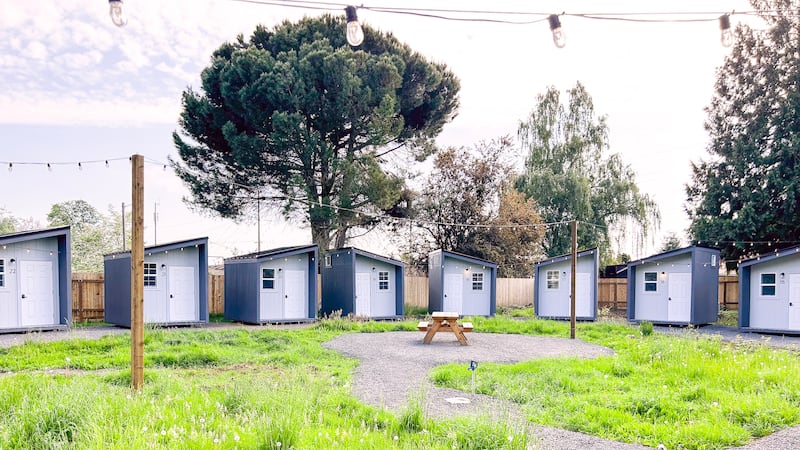The city of Portland began operating its first safe rest village in Multnomah Village last summer. Four additional villages have since opened across the city.
Yet not one of them has finalized a good neighbor agreement. That’s a document signed by several parties—in this case the neighborhood association and other affected parties, the city, and the contractor overseeing the village—to establish mutual expectations. The agreement isn’t binding, but the document signals a good faith agreement that parties will come to the table if issues arise.
Before the first village opened, the city received strong pushback from neighborhoods where it aimed to build pod villages. A patchwork of neighborhood associations made demands that the city implement various measures before opening the villages: conduct background checks, enforce no-camping rules around the perimeter, and require that site operators maintain the area around their site. The more amped neighbors feared the villages might attract drug use, violence, more tents and potentially even predators.
A year later, those fears haven’t come to pass, most neighbors will admit.
But one sticking point in particular is holding up two of the agreements: background checks of people wanting to stay at the villages. And the parties that won’t agree to such checks, neighbors say, are the Joint Office of Homeless Services and Multnomah County, which have historically opposed instituting any measure they perceive as a barrier for people living on the streets seeking help.
Bodo Heiliger, head of school at the International School of Portland, which is party to negotiations for a village downtown, says he would like the background checks to identify the most extreme felonies and crimes in order to protect the surrounding neighborhood.
“We wanted to make sure that not only our community was safe, but also those in the village and surrounding,” Heiliger says.
The agreements in limbo are a signal that the county and city are still at odds over a basic tenet of sheltering Portland’s homeless population: Should there be any barriers to entry, or will such barriers mean those who need help the most won’t get it?
“Generally speaking, higher-barrier approaches to shelter can work when they’re part of the program model, like a recovery or sobriety shelter. But safe rest villages are designed as low-barrier shelters, and they’ve been able to directly accommodate people relocated from camp cleanups with a more immediate and services-focused option,” Multnomah County Chair Jessica Vega Pederson tells WW. “To serve that population, targeted background checks would not be practical as a screening tool for entry.”
Below is the status of good neighbor agreements at the four villages currently in negotiations.
1. MULTNOMAH VILLAGE
This village was the first to open under the city’s model, in June 2022. Moses Ross, chair of the Multnomah Neighborhood Association, says it submitted what it hoped would be the final draft of an agreement to City Commissioner Dan Ryan’s office in the fall. Ryan’s office subsequently forwarded the document to Multnomah County to be signed.
Ross says his group has since had no updates from the county, leaving the agreement in limbo. The snagging point? Background checks.
“The SRV team was willing to work with us on that, but the sign-off on that high-barrier, low-barrier issue has to come from the Joint Office of Homeless Services,” Ross says.
2. QUEER AFFINITY
The Queer Affinity village along Southwest Naito Parkway lies near two schools: the International School of Portland and Bridges Middle School. Those schools pushed back ferociously prior to the village’s opening, but have since said it’s been without problems.
Much like the Multnomah Village, the sticking point for a good neighbor agreement has been background checks. Heiliger says the talks have stalled over the issue.
“All parties, apart from the county, have agreed to the terms,” Heiliger said. “We’ve been in agreement since I think the start of the school year.”
3. MENLO PARK
The Menlo Park village in East Portland’s Hazelwood neighborhood opened last fall, and its good neighbor agreement negotiations continue. Neighborhood association chair Arlene Kimura says the main sticking point has been who is responsible for the area surrounding the village.
“When you are a homeowner, you are not responsible just for the building, but for the grounds and the street in front of your house and the sidewalk,” Kimura says. “That same set of duties should bound whoever the service provider is.”
Cultivate Initiatives says it is already helping keep the area clean and safe, but doesn’t want responsibility for everything that goes on outside its gates.
4. PENINSULA PARK
The recently opened Peninsula Park village in North Portland is currently in talks with the county, city and neighbors to craft a good neighbor agreement.
Thomas Karwaki, chair of the neighborhood association, hopes they’ll settle on one quickly. That’s because the neighbors are not asking for background checks.
